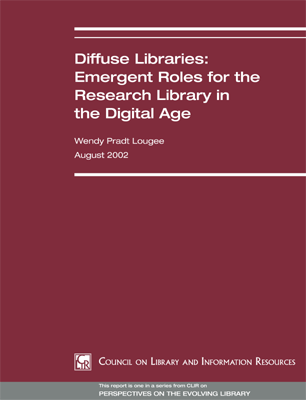Diffuse Libraries: Emergent Roles for the Research Library in the Digital Age

by Wendy Pradt Lougee
August 2002
Copyright 2002 by the Council on Library and Information Resources. No part of this publication may be reproduced or transcribed in any form without permission of the publisher. Requests for reproduction should be submitted to the Director of Communications at the Council on Library and Information Resources.
The Evolution of Library Roles
- Phase 1: The Growth of Distributed Technologies
- Phase 2: The Development of Open Paradigms and Models
- Phase 3: The Emergence of the Library as a Diffuse Agent
Library Roles in a Digital Age
- Collection Development
- Federation
- Library as Publisher
- Information Access
- Communities and Collaboratories
- Access and the Semantic Web
- User Services
- Virtual Reference Systems
- Information Literacy
- Organizational Models
- Library as Place
Realizing Diffuse Roles for Libraries
- Tangible Investments
- Intangible Investments
About the Author
Wendy Pradt Lougee was appointed University Librarian and McKnight Professor at the University of Minnesota University Libraries in June 2002. Previously, she served as associate director at the University of Michigan University Library and was responsible for developing one of the leading comprehensive digital library programs.
Preface
Wendy Lougee is a pioneer in the digital library world. While at the University of Michigan, she was instrumental in defining and shaping what we have come to call the digital library. She was among the primary movers at the Digital Library Federation (DLF) as well, and it was at her insistence that DLF member libraries did not lose sight of the importance of the word “Federation” in the group’s name. Ms. Lougee recognized, even in the early stages of DLF, that while digital technology was dramatically changing the roles of libraries, progress could be made only when a library’s contributions advanced the institutional, as well as the collective, agenda.
In several recent essays and reports, the Council on Library and Information Resources has explored the role of the library in the digital world. For example, we have considered questions about the nature of collections when libraries license rather than purchase content. What are the implications for long-term preservation? We have also asked questions about the importance of library space when readers can retrieve information from their desktops and no longer have to visit the library. How does the role of the librarian change in such an environment?
In the digital world, libraries are becoming more involved in the creation and dissemination of knowledge. Ms. Lougee asserts that this is changing the very nature of the library. She offers examples of the new roles that a few libraries have taken on. She notes that some of these roles are extensions of traditional library activity, but also notes that wholly new functions and opportunities are emerging. Collaboration with new and diverse partners has become more important than ever; however, building effective collaborative relationship requires far more than simply finding organizations that are willing to help the library do its work.
Notwithstanding the evolution of library roles, Ms. Lougee aptly notes that the library retains a distinct identity that holds special meaning for members of the academic community.
Deanna B. Marcum
President, CLIR

